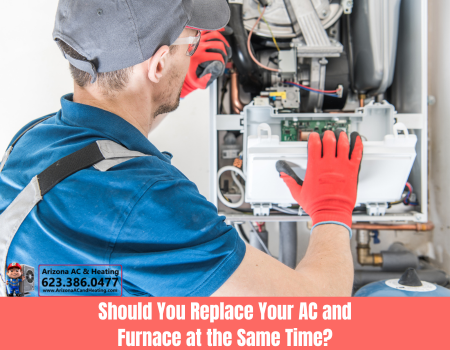Replacing your home’s HVAC system is a significant investment, and when one part of the system breaks down — whether it’s the air conditioner or the furnace — many homeowners face the same question: should you replace both at the same time, or just the unit that’s failing?
While it might seem cost-effective to replace only the broken component, there are important reasons why replacing both systems together could be a better long-term decision. In some situations, it’s not only the safer choice but also the more efficient one. Let’s take a closer look at when it makes sense to replace both, and when it’s fine to hold off.
 How Your AC and Furnace Work Together
How Your AC and Furnace Work Together
In most homes, the air conditioner and furnace share essential parts, including the air handler (or blower motor) and ductwork. Though they perform separate tasks — one cools, the other heats — they rely on the same system to distribute conditioned air throughout your home.
If one unit is significantly older or less efficient than the other, they may not work together smoothly. This can lead to uneven temperatures, reduced energy efficiency, and extra wear on the system.
Benefits of Replacing Both Systems at Once
Improved Energy Efficiency
Modern HVAC systems are much more energy-efficient than those made even a decade ago. Replacing both your air conditioner and furnace ensures you get a matched system designed to work at peak efficiency together. Mismatched systems can lead to reduced performance and higher energy bills over time.
Lower Long-Term Costs
While replacing both units involves a larger upfront cost, it often saves you money in the long run. You avoid paying for labor, permits, and installation twice. Many HVAC companies offer package discounts or manufacturer rebates when replacing both units at the same time, making it a financially smarter decision for homeowners planning to stay in their home for years to come.
Consistent Comfort Throughout Your Home
A new, properly sized, and matched system is more likely to provide consistent temperatures, better airflow, and improved humidity control. This can result in a noticeably more comfortable indoor environment year-round.
Coordinated Warranties and Service
Replacing both systems together means you’ll have warranties that start at the same time and cover similar terms. This makes maintenance, repairs, and any potential warranty claims much easier to manage.
Downsides to Replacing Both at Once
Higher Immediate Cost
The most obvious drawback is the higher upfront investment. Replacing both your air conditioner and furnace at once can be expensive, and not every homeowner’s budget can accommodate it.
May Be Unnecessary if One Unit Is Relatively New
If one part of your system is still fairly new and in good working condition, replacing both might not be cost-effective. A newer furnace or air conditioner that was installed within the past 5 to 8 years may still have plenty of useful life left.
When It Makes Sense to Replace Both
There are situations where replacing both your AC and furnace together is the better decision:
- Both units are over 10 to 15 years old
- You’re facing expensive repairs on one or both systems
- You want to upgrade to a high-efficiency HVAC system
- You’re planning to stay in your home for many more years
- The systems are mismatched in age, capacity, or efficiency
- You’re dealing with poor airflow, inconsistent temperatures, or humidity problems
If your systems are both nearing the end of their service life, replacing them together prevents future issues and ensures maximum efficiency.
When It’s Okay to Replace Just One
There are also scenarios where it makes sense to replace only the failing unit:
- One system is still fairly new and works reliably
- The systems are compatible and well-matched in capacity and efficiency
- Budget limitations make a full replacement impractical
- You plan to sell your home in the near future
If you decide to replace just one, it’s important to confirm with your HVAC professional that the new system will be compatible with your existing unit to avoid operational issues or reduced efficiency.
Deciding whether to replace your AC and furnace at the same time depends on the age, efficiency, condition, and compatibility of your existing equipment. In many cases, replacing both together provides better efficiency, comfort, and long-term savings.
However, if one unit is newer and still in good shape, replacing only the failing component can be a smart, budget-friendly choice — provided both systems are compatible. The best way to make the right decision is to have a licensed HVAC technician assess your system and discuss your home’s heating and cooling needs.
